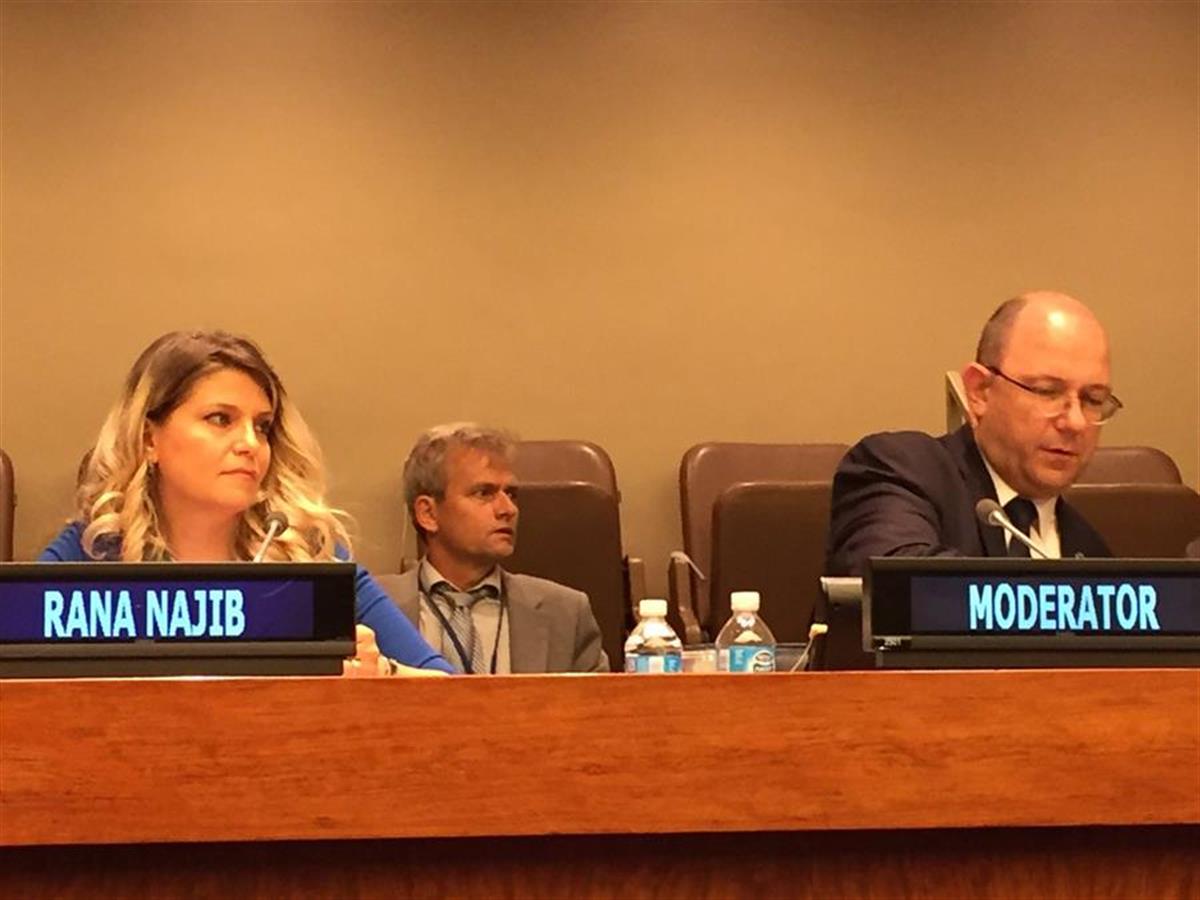
Rana Najib, who manages AVSI's educational projects in Lebanon, was invited by the United Nations to be a panelist in an interactive multi-stakeholder hearing, whose main goal was to provide an opportunity for member states to exchange views and to inform the inter-governmental negotiation toward the finalization of an outcome document for the UN Summit for Refugees and Migrants.
By Roberta Alves
Walking for the first time across the streets of New York, Rana Najib gets emotional when she sees the Syrian flag among the 200 that surround the Rockefeller Plaza.
“I wasn't expecting to see the Syrian flag here,” explained Ms. Najib.
Monday, July 18, 2016 was a very long and emotional day for this 38-year-old Syrian who had to move to Lebanon to find a better way to work and live after the war in Syria began. Currently managing educational projects for AVSI in Lebanon, Ms. Najib was invited by the United Nations to participate in a fundamental, pressing and, in her case, very personal discussion: how to address large movements of refugees and migrants. Her participation in an interactive multi-stakeholder hearing at the UN was fundamental for two reasons: she is originally from Syria and she works daily in the field with refugee children and adolescents, a background and experience that most of the panelists couldn't share with the audience.
“There were a couple of Syrians in the audience, but surprisingly none on the panel,” commented Ms. Najib after the event.
The main goal of the multi-stakeholder hearing was to provide an opportunity for member States to exchange views and to inform the inter-governmental negotiation toward the finalization of an outcome document for the United Nations Summit for Refugees and Migrants. The Summit will be held on September 19, 2016 at the UN headquarters in New York. Based on the most recent UNHCR Global Trends report (June, 2016), 65.3 million people were displaced from their homes by conflict and persecution in 2015, the highest number since UNHCR records began.
Ms. Najib exchanged ideas with a diverse group of speakers representing other international NGOs about the specific theme "Reframing the narrative on migration and refugees in the context of the 2030 Sustainable Development Agenda”. The other participants in the debate were Mr. Richard Bennett, Representative and Head of Amnesty International's UN Office; Ms. Sybil Nmezi, Executive Director of Generation Initiative for Women and Youth Network; Ms. Sandra Vermuyten, Head of Campaigns of Public Services International (PSI); Ms. Sandra Saric, Vice President of Talent Innovation, Information and Communications Technology Council (ICTC). They addressed the theme by answering three different questions. The first one was “How can we combat xenophobia and discrimination and build a strong narrative that recognizes the positive contribution of migrants for inclusive growth and sustainable development?”
Based on her experience with AVSI, Ms. Najib's answered that this is an issue that needs to be addressed using three different but combined efforts:
“One of the key elements to combat discrimination and build a strong narrative that recognizes the positive contribution of migrants is to engage local communities to work closely with refugees through social and educational projects,” said Ms. Najib. “The second element is to analyze discriminatory and exclusionary practices that prevent refugees from effectively participating in society, many times, resulting in a waste of talent. Finally, acknowledging the crucial role of the media can help build a positive image about the refugees.”
During the panel, Ms. Najib and the other participants also had to answer two more questions: “How can we encourage national and global leaders (political, social, economic and religious) and the media to promote a more positive narrative on migration and refugees?” and “How could NGOs and civil society, including the private sector and academia, contribute to a global campaign to counter xenophobia, as proposed by the Secretary-General in his report for the 19 September Summit?”.
“Unfortunately, some politicians constantly use bad narratives when talking about refugees to get consensus. This is one of the reasons why I believe that a great effort has to start from the bottom. We have to help citizens to accept that we are living in multicultural and pluralistic societies. In our globalized world, this is a fact that cannot be stopped or fought,” said Ms. Najib. “In other words, living together (different people from different countries, cultures and religions) can be a positive and enriching experience rather than a negative condition that needs to be avoided at all costs.”
Back in Lebanon, Ms. Najib is working on the project “Supporting the enrollment and retention of vulnerable children in public schools in Lebanon”. Funded by UNICEF and implemented by AVSI, the project aims to work with a total of 12,000 children and their families through four different initiatives: early childhood education activities targeting 4,230 children aged 3-6 years without access to Kindergarten; outreach activities to explain how families can enroll their children in the Lebanese formal public education; homework and remedial support that targets enrolled and at-risk children in public schools, and life skills activities for adolescents.
“Through this project, we are targeting children of all ages, starting from the little ones who have never been to school, but also helping families understand how to enroll their children in the Lebanese School system and provide after school support for those who are about to drop out because they are struggling”, explained Ms. Najib.
Rana's participation in the multi-stakeholder hearing had a considerable impact on her life, both professionally and personally.
“This opportunity taught me a lot about international cooperation and gave me the opportunity to network with partners and stakeholders,” said Ms. Najib. “Personally, I'm going back to Lebanon feeling more confident”.